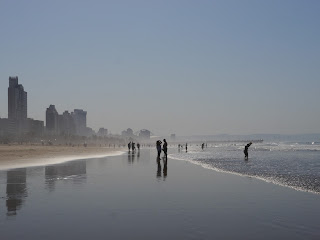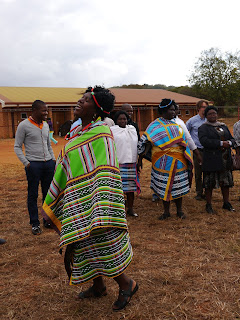7. All roads get you there sooner or later.


Whether one is running out of gas or just plain lost, it is a fair assumption that if you follow the taxis and the dirt roads to their ends you will find tarmac. With tarmac comes signage, and with signage (ideally) comes knowing where you are. This past week has involved two moments of “oh geez, where are we?” Now, I am not talking about being in a bad part of town, but just not heading toward the proper city. On our way back from Tiyani HC last week, Chris and I were in the car headed back from one of our trainings when we missed our turn (followed by 3 trailing cars). We were pretty sure we had missed it, but then decided we would be able to find the next tarmac road north and take it. Little did we know that meant 40 km’s east of where we actually wanted to be. While this likely would have only added an hour to our travel time (maybe), it would have led us back to Thohoyandou. In many ways, the story of making a u-turn to please the peanut gallery was fine, but unnecessary. Letting things happen isn’t always a bad thing. Along the road, you might just run into a gorgeous waterfall, a man selling jewelry at a gas station nowhere near ‘along the way’ or just see an ostrich walking alongside the road. Who knows?! But moral is that night always ends with a new morning, and dirt roads always lead to tarmac- U turns may be required (in the case of dead ends), but sooner or later you find gas and you keep going.




 with
that from a charity perspective, and people trying to just treat one another as
equals and being unable to do so for lack of knowledge. This makes for a
particularly frustrating shopping experience. Economic models lack these basic
elements of humanity to me, and maybe it all works out in randomness, but I
doubt it.
with
that from a charity perspective, and people trying to just treat one another as
equals and being unable to do so for lack of knowledge. This makes for a
particularly frustrating shopping experience. Economic models lack these basic
elements of humanity to me, and maybe it all works out in randomness, but I
doubt it.  |
| Durban Boardwalk post shopping/baragaining |

8. Beauty is subjective, historical and
cultural. Custom and tradition can limit progress.
There is such a cultural norm in Africa of good wives being at
least a little overweight. It’s interesting to see the notion of being ‘fattened-up’
to make a good wife (that I heard from my Ugandan home-stay momma) playing out
with girls here in Thohoyandou finishing nursing school and wanting to get
married. One of the girls we worked with specifically is trying to gain weight,
so that she will be able to marry. While that seems crazy as I know at least
half a dozen brides-to-be trying to lose weight in the USA, this is a
historical notion as much as a cultural one. It says that the girl can cook,
that she will be able to provide good food for her husband and children, but
also says she comes from a good family that does not starve her. In the
background context of people dying of hunger, it seems fitting you would want
to marry someone healthy. Just healthy seems to be relative to the rural norm,
not the medical one.
Coming out of hypertension and diabetes trainings, the food-based
lifestyle changes needed for South Africans seemed to receive the greatest
push-back and while I initially blamed this push-back on the notion of wealth and
weight being correlated, it was not the only
reason. In a country that has been ransacked by the AIDS epidemic, there are
also challenges in overcoming the desire to hide one’s status and prevent the
shaming of the self and the family. Losing weight is a sign of AIDS and so in a
context where people are regularly dying of AIDS and wasting is a sign that
things are not going well.
Fear that losing weight will announce to the world
you have AIDS is something most South Africans would do anything to prevent.
The stigma and the isolation that often follows being diagnosed and categorized
is poignant. Whether or not losing weight is actually indicative of status,
there is fear. This fear is incredibly dangerous in a community where chronic
illness is becoming more and more common by the hour. Overcoming the fear of
visibly losing weight and turning it into a positive thing is not going to be
easy, and I am not sure outsiders will be able to turn the tables.
Coming from a place where losing weight is a sign that you are
capable of keeping New Year’s resolutions (good self-control), that you value
health &/or fitness and that you will make a more capable juggler of life
(are not lazy). It is a strange dynamic to tell people to lose weight for their
lives, to do it for their children, to prevent themselves from having a
stroke... Changing the diet of local peoples to include less pap (a white
starch eaten in massive quantities with a little sauce) is going to be really
hard to change, diminishing salt intake will be tough as well, and increasing
the intake of fresh veggies (rather than cooked to oblivion or canned ones from
Shoprite) will take the dedication of these home-based carers beyond their
normal call of duty. Particularly because losing weight is seen to be so negative.
This irony is of course met by the double standard that foreigners and whites
are expected to be thinner (and therefore beautiful), but that adds a whole additional
layer of complication.
9. Economics says humans are rational, but circumstances
are such that there is no such thing as perfect information. So have we ever
truly been tested?
In some ways, humans are rational in the moment. We often weigh
the options that lay before us, but on any given day, the weights applied to
different things can be heavily skewed. So if this is the case, then how do we
actually use economic and statistical modeling? If one day something is too
risky, and another it is the safest of alternatives how could we possibly ever
include enough into the modeling to make anything useful come of them. People
make decisions in many ways, but very few moments exist where people would not
change their mind with one more piece of information.
Here in the markets, bargaining assumes perfect information and competitive
processes that get us to the best price and yet many of the people I have been
traveling with don’t bargain. This is not merely based on a lack of language
skills. Whether they don’t feel the need to bargain or assume that the extra 50
cents will do more for the person they are working with, there is some version
of philanthropy/charity/altruism that is
skewing the market. Among sales people, a sense of “milk it if they don’t know
what to pay” is quite common- and a clear example of imperfect information
sharing. So you not only have people trying to overcharge, people being okay
If there are reasons that public policy and public health
interventions fail, it seems to be that it is because there is no way to
culturally be honest with one another on the superficial levels in which most
people interact during trips like these. When the superficial levels are
skewed, how can you truly reach the deeper levels of understanding. In some
ways, people are too guarded, hiding their cards in order to have a leg up on
at least one other person.
10. Displaying faith is more than religion; it’s
faith in people not just in God.
Religion is important to people everywhere. There are so many
people that are active participants in religion and one of the most striking
things for me this past month has been seeing the ZCC 5 pointed star on the
green felt lapels of so many people here in Thohoyandou. They wear the pins
everyday dutifully, but as a Jew with the recent history of the holocaust and
the Rwandan genocide as part of my understanding of what humanity can do, I
wonder how strong this custom is. Persecution is common, and flares its evil
glare on people when they least expect it. In some ways, wearing this pin is a
curious thing to me- it seems fearless of being targeted. It states pride in
self, faith that you will be able to share your religion with others to spark
conversation, but in my opinion it also makes you vulnerable. In wearing
something like this uniform or pin, you alienate, or at least separate yourself
from others. You risk being different by conforming to a small group and open
yourself to be targeted for that difference.
As one who’s never looked Jewish to the average eye, it is always
a surprise when people learn this. They laugh at themselves for just assuming that
my dirty blonde hair and blue eyes are those of a Christian, I don’t fit the
stereotype and easily evade negative attention for my religion. Not that I
think the neighborhoods and friends that I have found throughout my life would
have treated me any differently for my religion, but if it had been part of my first
impressions from day one, how would that have changed the way I saw the world?
I believe it would change a lot. These men and women of the ZCC church open
themselves to categorization before they even interact with another person
through purely visual means, something that in my mind is bold.
In some ways, having these pins on is brave. It is a claim of
faith in a minority sect of a religion and a god, but it also claims a faith in
people. A faith that people will come together and that ideas and religion will
not be targeted by disagreeing groups is something few people have come to
terms with. Some survivors keep their tattoos from the camps as a reminder,
others as a declaration of survival, and some have them removed- wishing to
forget. Faith in humanity, rather than fear of it, separates this very small
and yet consistent action from merely following tradition and makes it lived
faith.











































